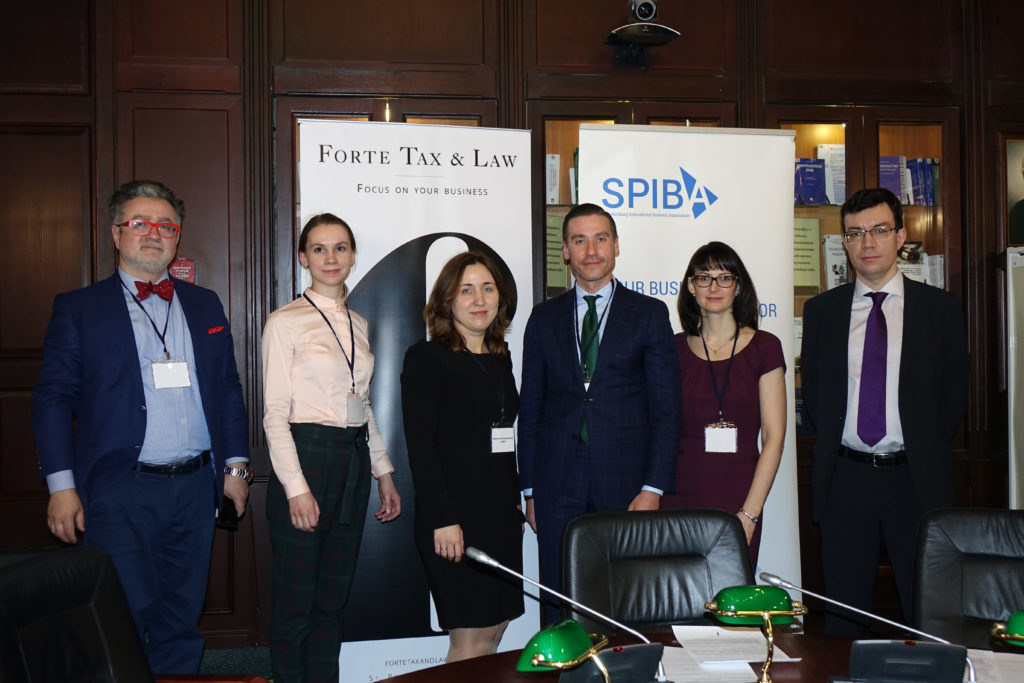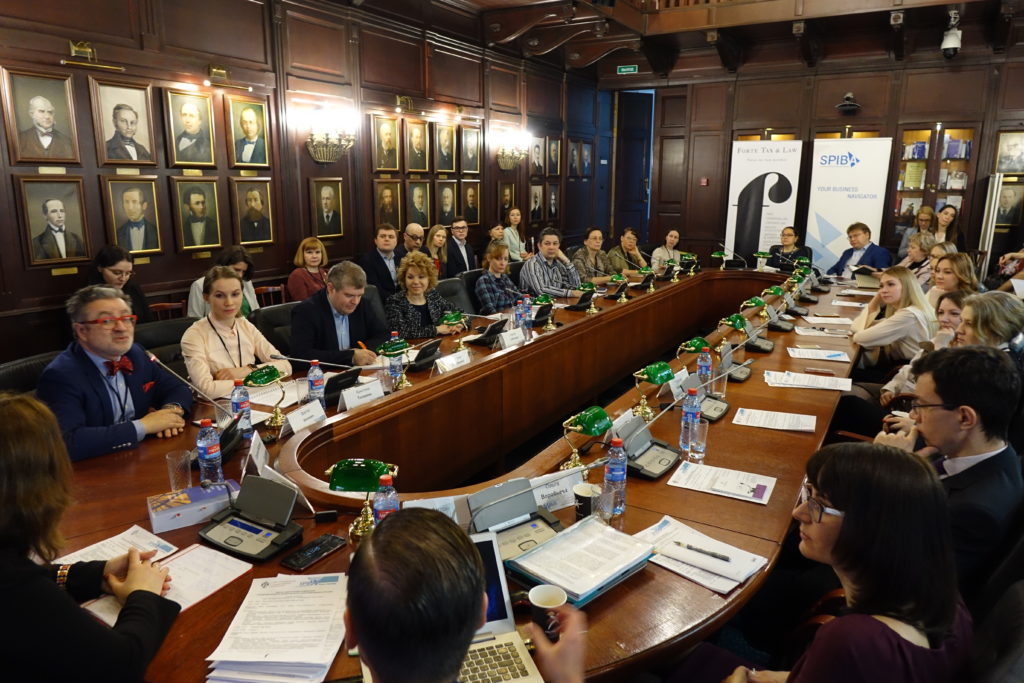Forte Tax & Law » News » International taxation trends discussed at SPIBA and St. Petersburg State University
International taxation trends discussed at SPIBA and St. Petersburg State University
A conference on Development Trends in International Taxation in Russia was held on April 04, 2019 at St. Petersburg State University. Anton Kabakov, partner at Forte Tax & Law, moderated one session and also made a presentation on transfer pricing trends.
Jointly organized by St. Petersburg State University and SPIBA Finance Committee, this event took place as part of Russian Tax Week with speakers from the Russian branch of the International Tax Association, the Chamber of Tax Consultants, the faculty staff of St. Petersburg University and business representatives.

Issues related to inter-country cooperation and international law are particularly sensitive these days. Tax law, which is intended to regulate the relationship between tax authorities and taxpayers, plays an important role in shaping and regulating the economic component of state policy, including internationally.
Although current regulations make some allowances for tax optimization, very often taxpayers overstep their right, hoping to reduce their tax burden by using different schemes and/or setting up some that have no place in good practice. Various general and special rules have therefore been put in place to address tax abuse.
Elena Kilinkarova, Senior Lecturer at St. Petersburg State University, described a set of general and special anti-tax evasion measures currently existing in Russian tax law. These measures can be found both in national regulations (laws and court practice) and international treaties. Elena also outlined possible changes in existing rules, especially on the back of Russia joining the MLI (Multilateral Convention to Implement Tax Treaty Related Measures to Prevent Base Erosion and Profit Shifting). The application of these rules is a highly debated topic in legal circles. Elena Kilinkarova commented: “Tax abuses must be tackled but not without well-defined measures. It needs to be clear which particular measure should be applied in each situation.” Elena considers that there is no clear approach in Russian case law to the delineation of anti-tax evasion rules as is most clear in the example of the Russian interpretation of the concept of actual right to income. According to this rule, only foreign companies which are “actual recipients of income” may apply the benefits granted under double taxation treaties, and Russian tax agents must take this into account. The purpose of this rule is to minimize abuses in cross-border payments of income.
Viktor Machekhin, Vice-President of Ros-IFA, holds that the notion of “actual right to income” is fundamentally a national concept, and international experience cannot serve for Russia as an example of its improvement. “If we talk about the concept of actual right to income as a universal tool, then I’m in favor of applying it to any income paid from Russia. In my opinion, actual right to income is an objective category deriving from elements of taxation” noted Viktor.
Olga Vorobieva, Head of Legal Practice at Emerging Markets Group, spoke about using actual right to income as a universal tool for combating tax schemes. Olga explained how conduit companies are determined in real court cases and how the evidence base to prove their absence is built.
In her presentation, Kristina Tokareva, President of Ros-IFA Youth Division, called for a very subtle and skillful use in Russia of OECD Model Tax Convention Commentary. “The legal status of these commentaries should be determined for each individual case. Depending on the facts and particular circumstances, in one case we should use some tools and, in another case, other tools” summed up Kristina Tokareva.
Anton Kabakov, Partner at Forte Tax & Law, spoke about the general trends in transfer pricing that have arisen from international practice. Anton considers that transfer pricing boils down to what, how and with what to compare transactions. There are five methods for transfer pricing analysis, and one of these, the Comparable Uncontrolled Price Method, is the priority method. Taxpayers are entitled by law to choose the method they want to use to compare their transactions. They are not required to justify their choice, but tax authorities often disregard this right.
Anton recommends: “When applying any method based on profit margin, we need to justify our choice in great detail. Next, we need to focus on the selection of comparable companies as we need to choose companies that are not merely similar but virtually identical to that of the taxpayer requiring transfer pricing documentation.”
Sergey Ovsyannikov, Senior Lecturer at St. Petersburg State University, spoke about the latest court practice on the requalification for tax purposes of cross-border business relationships.
Another topical issue broached at the conference was the automatic exchange of data for tax purposes. Sergey Sosnovskiy, Partner at Pepelyaev Group, argued that a number of technical, organizational and even political issues should be resolved to ensure effective data exchange. For example, Russia for the first time in November 2018 transferred data as part of such automatic exchange, but data submission was delayed for technical reasons. But even once the technical problems of data access are resolved, the issue of data processing will need to be tackled. To do so, it is necessary to introduce special information systems in the practice of Russian tax authorities. Work is being done in this direction, but what and when the results will be, only time will tell.
The conference ended with a brief but very important presentation from Alexander Pogorletskiy, Professor at St. Petersburg State University, on the taxation of cross-border e-commerce in Russia. Alexander highlighted that for the time being the taxation of income and cross-border e-commerce transactions in Russia is more about fulfilling fiscal goals than supporting business. He also noted the willingness of Russia and other countries to cooperate in this field.

To conclude, the unique format of the conference should also be noted not only in terms of the topics covered but also in terms of the participants. The dialogue and exchange between the academic and business communities have proved to be very productive. The importance of the event was also noted by Sergey Belov, Dean of St. Petersburg State University Law Faculty, in his opening speech: “I’m pleased that such an interesting topic as international taxation is the subject of discussion of our first joint event with St. Petersburg International Business Association […] and hope that our cooperation with SPIBA will not stop at one conference but will carry on and develop further.”
